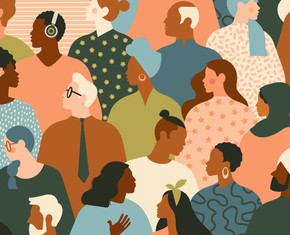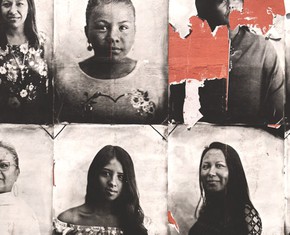The views expressed in our content reflect individual perspectives and do not represent the authoritative views of the Baha'i Faith.
Our societies face a crisis of truthfulness, where obfuscation, falsehood and lying have overcome and even taken the place of truth-seeking. How then can we restore truthfulness?
To answer this question, let’s examine what the Baha’i writings have to say about the nature and dynamics of truthfulness. The first Baha’i principle – the independent investigation of truth – recognizes the fact that every person has the responsibility to determine the truth:
God has given man the eye of investigation by which he may see and recognize truth. He has endowed man with ears that he may hear the message of reality and conferred upon him the gift of reason by which he may discover things for himself. This is his endowment and equipment for the investigation of reality. Man is not intended to see through the eyes of another, hear through another’s ears nor comprehend with another’s brain. Each human creature has individual endowment, power and responsibility in the creative plan of God. Therefore, depend upon your own reason and judgment and adhere to the outcome of your own investigation; otherwise, you will be utterly submerged in the sea of ignorance and deprived of all the bounties of God. – Abdu’l-Baha, The Promulgation of Universal Peace.
When we depend upon our “own reason and judgment” we give ourselves the great gift of truthfulness:
Truthfulness is the foundation of all human virtues. Without truthfulness progress and success, in all the worlds of God, are impossible for any soul. When this holy attribute is established in man, all the divine qualities will also be acquired. – Abdu’l-Baha, quoted by Shoghi Effendi in The Advent of Divine Justice.
As this passage suggests, truthfulness is vital to spiritual growth and well-being. Indeed, the conscious journey of the soul seeking to return to its ultimate Beloved and Source of its being begins when the soul becomes truthful.
In other words, each person’s spiritual journey starts with the thirst for truth. We all hunger for that truth – in fact, our souls cry out for it. The Baha’i teachings say that a sincere search for the truth involves the earnest questioning and determination of a “true seeker.” That search for the truth, Baha’u’llah wrote, engages our willingness to “sacrifice all things,” “that is, whatever he hath seen, and heard, and understood,” in order to find the truth. – The Seven Valleys, in Call of the Divine Beloved.
So our ability to discern truth depends on possessing the inner spiritual quality of truthfulness, and not merely on intellectual training and reasoning ability. The profoundly spiritual nature of truthfulness becomes clearer when we realize its close connection to detachment: “No man shall attain the shores of the ocean of true understanding,” Baha’u’llah wrote, “except he be detached from all that is in heaven and on earth.” – The Book of Certitude.
Our self-centered perspectives and desires, and the ways we have been conditioned to perceive the world, necessarily distort our perceptions of reality. The task of cleansing ourselves of these distortions involves emotional and spiritual and not solely intellectual work. Baha’u’llah further clarified that a true understanding of God’s word is “in no wise dependent upon human learning” but rather depends “solely upon purity of heart, chastity of soul, and freedom of spirit.” – Ibid. This suggests that, in order to discern truth, our hearts must be purified from self-concern and self-centeredness, our souls must be true in relation to the beauteous “image of God” religion tells us is “engraved” on us, and that our spirits must be freed from blindly imitating tradition.
The Guardian of the Baha’i Faith, Shoghi Effendi, explained that “religious truth is not absolute but relative.” – The Dispensation of Baha’u’llah. Given the limitations of human consciousness, our views of truth have always been and will always be relative to historical times, to cultural vantage points, and to the stages of an individual’s spiritual development. For example, statements of truth that were adequate to help children make sense of the world and allowed them to thrive and grow within it, will no longer work for adolescents or adults. This does not mean, however, that all perspectives on truth are equally useful. The conclusions arrived at by someone who rigorously strives to recognize and overcome prejudices, who commits to engaging in respectful and open-minded dialogue with diverse others, and who refuses to lie are not equal in value and usefulness to the opinions of one who does not bother examining inner prejudices and who accepts without questioning the identity and worldview received from society.
So, how can we revive truthfulness in our world?
To answer, we should first take notice of the fact that some social environments encourage truthfulness while others discourage it. In the Baha’i view, environments that encourage truthfulness benefit from the educative influence of true religion – not dogma or doctrine, but the original message of love, compassion and truth from the founders of those great Faiths. Ultimately, the light of divine revelation – the influence of the Holy Spirit brought to our world by successive divine educators such as Abraham, Krishna, Buddha, Moses, Christ, Muhammad and Baha’u’llah – awakens and nurtures spiritual qualities like truthfulness, honesty, justice, love, kindness, hope and faith in the human soul.
It may seem strange to some to assert that the development of truthfulness depends on the influence of religion, given how, throughout history, blind adherence to dogma and superstition have been enforced, and questioning suppressed, in the name of religion. But, according to the Baha’i teachings, any religious expression exhibiting such qualities is not true religion. Rather, true religion can be recognized by certain signs:
The purpose of the one true God in manifesting Himself is to summon all mankind to truthfulness and sincerity, to piety and trustworthiness, to resignation and submissiveness to the will of God, to forbearance and kindliness, to uprightness and wisdom. His object is to array every man with the mantle of a saintly character, and to adorn him with the ornament of holy and goodly deeds. – Baha’u’llah, Gleanings from the Writings of Baha’u’llah.
… by religion we mean those necessary bonds which have power to unify. This has ever been the essence of the religion of God. – Abdu’l-Baha, from a tablet written to the Sixth International Congress of Free and Progressive Christians and other Religious Liberals.
True religion is based upon love and agreement … If religion and faith are the causes of enmity and sedition, it is far better to be nonreligious … – Abdu’l-Baha, The Promulgation of Universal Peace.
When religious institutions cease to manifest these qualities of truthfulness and unity, they become a form without spirit.
The most effective way to restore truthfulness in our world, Baha’is believe, involves promoting universal approaches to education and community-building that reflect the deep spiritual principles of true religion. The global Baha’i community strives to do exactly that, by freely providing education for spiritual and social transformation open to all people of all faiths and no faith. This movement, occurring at the grass roots of society in the form of Baha’i study circles, children’s classes for moral education, junior youth empowerment programs and community devotionals, helps imbue the participants with love, unity and truthfulness – and focuses on applying these principles consistently to everyday life.
You May Also Like
Comments

















1 the use of centralized planning in an attempt to manage social change and regulate the future development and behavior of a society: the country's unique blend of open economics and social engineering.
2 (in the context of information security) the use of deception to manipulate individuals into divulging confidential or personal information that may be used for fraudulent purposes: people with an online account should watch for phishing attacks and other forms of social engineering | [as modifier] : he's seen everything from the most devious hacks to the simplest social engineering scams.